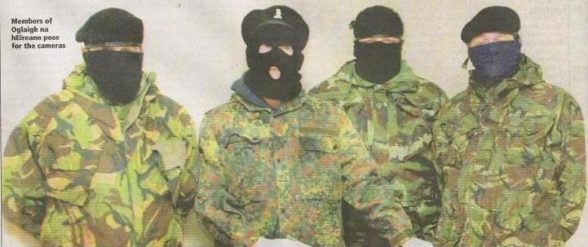
Oglaigh na hEireann says it is on ‘de facto’ ceasefire but has no plans as yet to disarm
THE violent dissident republican terror group Óglaigh na hÉireann – ONH – which counts Derry among is membership – is on a ‘de facto’ ceasefire.
The shadowy organisation – which has been heavily infiltrated at leadership and ground level by the PSNI and MI5 – has issued a statement to say it “will not contemplate disbandment or disarming” as part of any process that may lead to the ending of its armed campaign.
The organisation last night said it is involved in a “wide ranging discussion about tactics, strategy and the future of the republican struggle”.
Sources close to Óglaigh na hÉireann (ÓNH) say that while no official announcement has been made the organisation is currently on a “de facto ceasefire” while internal discussions take place.
However, sources say that depending on how talks go it could be at least a year before any formal ceasefire is announced – if the group reaches that point – but no official announcement can be expected in the “foreseeable future”.
The security forces have long proved a headache for ONH with members, both at low level and on its command structure, recruited as informants.
Explosives in devices were “neutralised’ before they were planted and weapons interfered with to prevent them firing proving difficult of ONH to carry out murder operations.
In all its years of existence, ONH has yet claim one murder. It came close in January 2010 when it tried to kill Derry-born police officer Peadar Heffron when it planted a bomb under his car while he drove to work.
The Gaelic speaking constable miraculously survived but was left paralysed and in a wheelchair for the rest of his life.
Two of its most senior members are currently awaiting trial on terrorist charges after they were caught in covert Garda surveillance operation.
It is believed its last significant terrorist attack was in November last year in Co Derry when it left a device on the Legavallon Road in Drumsurn which forced homes to evacuated.
Oglaigh na hEireann (ONH) later issued a statement claiming responsibility for planting the device.
It claims the device has been left there some five weeks ago.
The shadowy group has not specified what type of device it is that police are trying to locate.
In April this year, ONH threatened to “execute” a drug dealer in Derry.
In a statement to a local newspaper, the group said: “If he ignores this warning, we will have no option but to execute him.”
Outside of Derry, the most recent attack carried out by the group was in January when a roadside bomb was left for police in Twinbrook, on the outskirts of west Belfast, was defused by the British army.
Now for the first time the paramilitary organisation has spoken publicly about the development.
“Over the past number of months Óglaigh na hÉireann has conducted a wide-ranging discussion about tactics, strategy and the future of the republican struggle,” it said.
“In order to clarify some rumours and falsifications this does not connote an immediate ceasefire.
“It certainly doesn’t translate to disbandment or disarming – Óglaigh na hÉireann will not contemplate these options.”
The organisation denied that any contacts are in place with the British or Irish governments as part of the process.
“Óglaigh na hÉireann would like to make or clear that our current leadership has not held any discussions, bi-lateral or otherwise, with the British government,” it said.
“A back channel with any government does not exists and we never attempted to explore this option, despite some media assertions.”
The statement said the group will continue to hold internal discussions on its future.
“Our rethinking process will continue, unhindered by external elements attempting to dictate the pace and impede on our future decisions.”
Óglaigh na hÉireann emerged from a split with the Real IRA around a decade ago.
While it is not believed to have killed anyone, it has been responsible for a series of gun and bomb attacks targeting the British army and PSNI.
Its main centres of support have traditionally been in Derry, Belfast, south Down, south Armagh and north Louth.
Details of the dramatic shift in thinking within the paramilitary group came last month during a 1916 commemoration address in north Belfast by leading member of the Republican Network for Unity, which is viewed as Óglaigh na hÉireann’s political wing.
Speaking at the annual Na Fianna hÉireann commemoration in Ardoyne senior RNU member and former republican prisoner Gary McNally said that “a strategic rethink is required from the individual republican activist and organised republicanism”.
“We recognise that we must move forward with our people, not without them and not ahead of them or eventually they will move forward without us,” he said.
“For too long Irish republicans have remained on their knees, constrained by an inability to modernise and accept the situation on the ground.”
Tags:





